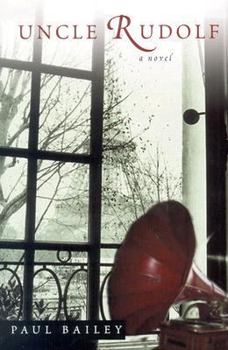Uncle Rudolf
Select Format
Select Condition 
Book Overview
In Uncle Rudolf , two-time Booker-Prize finalist Paul Bailey has crafted an exquisite, profoundly moving portrayal of a charismatic and popular performer in World War II-era Europe, and the orphaned... This description may be from another edition of this product.
Format:Hardcover
Language:English
ISBN:0312318340
ISBN13:9780312318345
Release Date:February 2004
Publisher:St. Martin's Press
Length:183 Pages
Weight:0.75 lbs.
Dimensions:0.8" x 5.9" x 8.5"
Customer Reviews
1 rating
A subtle story of exile from fascist Romania
Published by Thriftbooks.com User , 13 years ago
Andrew Peterson was born Andrei Petrescu in Romania, and he tells his story at the age of 70. His maternal grandfather was Jewish, and that is enough to imperil the family in 1937 Romania when Codreanu, the founder of the antisemitic Iron Guard, was on the ascendant and violence was already on the rampage. Andrei's father decided to send his seven year old son to England to be looked after by his paternal uncle Rudolf Peterson (born Rudi Petrescu), who had made a name for himself there and in other European capitals as a singer in operettas. Rudolf had seen some time ago that how Romania was becoming increasingly fascist, had become a voluntary exile in London, and had urged his brother and sister-in-law - in vain - to leave "the beastly country" of their birth. (The miasma of antisemitism in Romania had not even disappeared when Andrew revisited his ancestral home after 1989.) Andrew never saw his parents again, and though he was very comfortable with his beloved Uncle Rudolf in the day-time, his dreams at night were haunted by his absent parents. Rudolf loved his nephew dearly, worked hard to turn him into an Englishman, and tried to protect him from suffering - so it is not until Andrew is eighteen that he learnt of the fate of his parents. Much of the book, as its title suggests, is a rich portrait of the uncle who was the key figure in Andrew's life: of his ambitions and disappointments, of his relationships with a number of women, of his generosity, of his charismatic, amusing and carefree exterior covering up a deeper melancholia, grief, anger and self-contempt. Back in the 1920s he had ignored the urging of his teachers (the historical figures of Jean de Reszke and Georges Enescu) to aim higher than operettas: he had the talent to become a famous singer in grand opera. In time - too late to change course - he had himself come to despise operettas, whose frivolity and easy sentimentalism had been so enjoyed in Vienna, Bucharest and Budapest "by those who brought about Europe's destruction". The novel moves backwards and forwards in time. What happened to Andrew's parents is touched on several times; and the full story, when it comes near the end of the novel, is intensely moving. A subtle story interweaving the personal, the cultural and the political.




